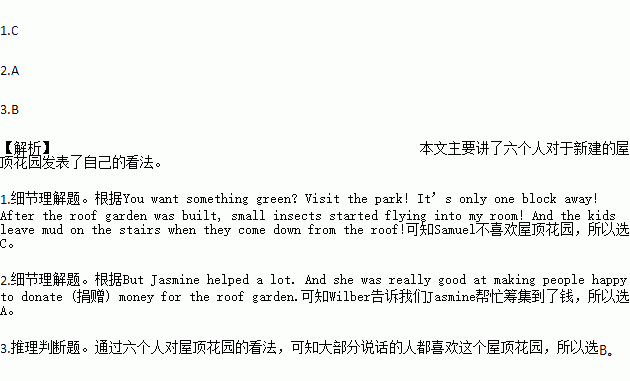题目内容
Six people are talking about the newly-built garden on the roof of their building.
Jasmine: I loved the idea when Wilber first told me about it. We had lots of meetings with our neighbors, trying to make them understand why it’s good to build a garden on the roof. Now people love coming here, and we have made a lot of friends!
Wilber: The whole thing wasn’t easy at first. But Jasmine helped a lot. And she was really good at making people happy to donate (捐赠) money for the roof garden.
David: My kids love going up there. They sit there watching butterflies and birds. The roof garden brings them closer to nature.
Samuel: You want something green? Visit the park! It’s only one block away! After the roof garden was built, small insects started flying into my room! And the kids leave mud on the stairs when they come down from the roof!
Rosie: Our building is now cooler in the summer. My baby sleeps well even on hot summer days!
Flora: Guess where these tomatoes are from! Not from the supermarket. They’re from our roof! It’s wonderful, isn’t?
1.Who dislikes the roof garden?
A. Jasmine B. Rosie
C. Samuel D. Flora
2.What does Wilber tell us?
A. Jasmine helped to get the money.
B. Tomatoes grew well on the roof.
C. Children always make stairs dirty.
D. There are birds in the roof garden.
3.What can be inferred from the interview?
A. Babies like sleeping in the roof garden.
B. Most of the speakers love the roof garden.
C. The roof tomatoes sell well in the supermarket.
D. David first came up with the idea of a roof garden.
 口算能手系列答案
口算能手系列答案

 up and become successful, because I hated my one-eyed mom and our poverty.
up and become successful, because I hated my one-eyed mom and our poverty. 59, Elizabeth Blackwell was officially recognized as a doctor in Great Britain — the first woman to be honored. She was the inspiration of Elizabeth Garrett, who began the women’s medical movement in England. Florence Nightingale, founder of the practice of nursing by women, was another of her friends.
59, Elizabeth Blackwell was officially recognized as a doctor in Great Britain — the first woman to be honored. She was the inspiration of Elizabeth Garrett, who began the women’s medical movement in England. Florence Nightingale, founder of the practice of nursing by women, was another of her friends.